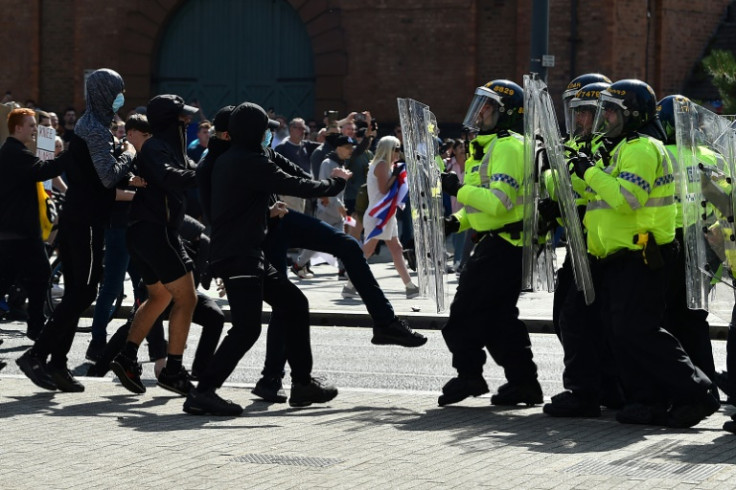
The United Kingdom is currently facing one of its most severe periods of civil unrest in recent memory, with riots breaking out nightly across England and Northern Ireland. The violence has been ignited by a tragic incident in which three young girls were brutally murdered during a Taylor Swift-themed holiday club on July 29. The assailant, armed with a knife, unleashed terror at the event, and subsequent rumours falsely identifying the attacker as an illegal immigrant have fuelled a wave of misinformation, leading to widespread disorder.
Unrest Sweeps Across the UK: A Nation on Edge
The unrest has been most prominent in towns such as Southport, Liverpool, and Walton, with significant flare-ups in city centres across the country. The Metropolitan Police in London has had to dispatch 200 riot officers to assist forces in Greater Manchester, and further reinforcements have been sent from the south-east to the north-east of England. In total, approximately 6,000 riot-trained officers are currently deployed nationwide, some engaged in countering planned far-right rallies, while others stand by to support their colleagues where needed.
However, it's not just far-right groups causing disruption. On Wednesday, anti-racism and anti-fascist protesters organised large counter-demonstrations across cities including London, Birmingham, Bristol, Liverpool, and Newcastle, leading to further tension and potential for violence.
Impact on Businesses and Homeowners: What to Know
Amidst this turmoil, many homeowners and businesses are understandably anxious about the potential impact on their properties and livelihoods. With reports of ongoing protests and looting, concerns about damage and loss are mounting. Fortunately, there are several avenues for financial redress available for those affected.
Most household and business insurance policies in the UK include coverage for physical damage to property, which means that if your home or business premises have been damaged during the riots, you are likely entitled to compensation. Comprehensive motor insurance policies typically cover damage to vehicles as well, so if your car has been vandalised or destroyed, you should be able to claim for repairs or replacement.
Understanding Your Insurance Coverage

For homeowners, building insurance policies generally cover property damage, including the structure of the building and any permanent fixtures and fittings. If the damage to your home forces you to relocate, many insurance policies will also cover the cost of temporary accommodation until repairs can be made.
Similarly, if you have a combined buildings and contents insurance policy, your possessions should be covered if they are damaged, destroyed, or stolen during the unrest. It's important to contact your insurer as soon as possible to report the damage and initiate a claim. If you hold separate buildings and contents policies with different insurers, you will need to make claims under both policies.
For business owners, commercial insurance policies often include coverage for damage to premises and stock. In addition, many policies feature business interruption insurance, which can compensate for lost income if your business operations are disrupted due to property damage. Some policies may also include denial of access cover, which provides compensation if your business is unable to operate because access to your property is restricted. Additionally, non-damage business interruption cover may be available, though it is often an optional add-on, so it is crucial to review your policy documents to confirm your coverage.
If you are uncertain about what your insurance policy covers, it is advisable to speak directly with your insurer or broker to clarify your position .
Riot Compensation Act: Additional Avenues for Redress
In instances where traditional insurance does not cover the full extent of the damage, or if your claim is denied, you may still have options under the Riot Compensation Act 2016. This legislation allows individuals and businesses that have suffered criminal damage during a riot to seek compensation from the relevant police claims authority.
Under the Act, victims must demonstrate that the damage or loss was caused by a riot, as defined under section 1 of the Public Order Act 1986. Claims must be submitted within 42 days from the date the riot ends. If your insurance claim is rejected, you have 42 days from the date of denial to approach the official compensation scheme. Compensation may be provided either as a cash settlement or through repairs paid for by the claims authority .
The police and crime commissioners for each area in England and Wales are typically responsible for handling these claims, though in London, the Mayor's Office for Policing and Crime and the Common Council for the City of London police area serve as the claims authorities. Contact details for these authorities can be found on their respective police force websites.
Government Response and Future Outlook
As the situation continues to unfold, the UK government is taking steps to address the unrest and mitigate further damage. Prime Minister Rishi Sunak has held multiple emergency Cobra meetings since the violence began, and has urged the country to remain on "high alert" for additional disturbances. During a visit to a Met Police control room in Lambeth, Sunak emphasised that those plotting further disruptions, as well as those inciting violence online, will face the "full force of the law."
Meanwhile, Sir Keir Starmer has issued a stern warning to far-right agitators, declaring that there will be no leniency in prosecuting those responsible for inciting violence and unrest. The government's message is clear: there will be a strong and coordinated response to restore order and hold those accountable who have contributed to the chaos.
As the UK braces for potential new outbreaks of violence, businesses and homeowners affected by the riots are encouraged to review their insurance coverage, consider the Riot Compensation Act as a backup, and stay informed of further developments .







